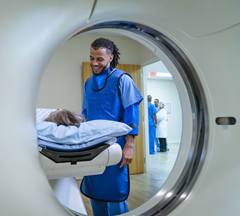Surprising News About Your Appendix — And Appendicitis

Answer a few questions and we'll provide you with a list of primary care providers that best fit your needs.
You probably never think about your appendix — unless you or a loved one experiences the pain of appendicitis.
Once thought to be a useless organ, scientists now believe the small, tube-like appendix plays a key role in keeping our immune systems healthy and strengthening the brain-gut connection.
The Gut-Brain Connection
The appendix is part of the digestive or gastrointestinal (GI) tract. It is a four-inch tube attached to the first part of the large intestine (cecum), close to where the small and large intestine meet. This is your lower right abdomen.
The digestive system breaks down the food we eat so that our body’s cells can absorb the nutrients and energy they need to function. In addition, the GI system serves as a communication center for the brain. The brain and gut constantly send and receive signals about:
- What we’re eating
- How to digest what we’re eating and drinking
- Our stress levels
- Our mood
The Appendix: A Safe House For Good Bacteria?
For many years, doctors and scientists thought the appendix was a vestigial organ – a body part no longer needed by modern man.
Recent research finds the appendix may be a safe place for the good bacteria that lives in our digestive tract. Good bacteria are essential for digestion and in fighting disease. The body works hard to maintain a delicate balance, which includes the right mix of bacteria in our “gut microbiome.”
When we get sick, such as with diarrhea or a stomach virus, our body loses much of its good bacteria, found on the lining of the GI tract, along with white blood cells and other immune cells that fight infection. Studies show that the inside of the appendix contains this same material in larger amounts.
Scientists now believe that the appendix serves as a “safe house” protecting good bacteria during infection, and repopulating the GI tract once the infection is gone.
Scientists now believe that the appendix serves as a “safe house” protecting good bacteria during infection, and repopulating the GI tract once the infection is gone.
Is Your Abdominal Pain Appendicitis?

Sometimes the appendix itself becomes infected. An inflamed appendix can be caused by:
- A GI tract infection
- Growths or stool blocking the appendix’s opening into the large intestine
- Trauma to the abdomen
There is no evidence that diet and nutrition play a role in causing or preventing appendicitis.
Although anyone can get appendicitis, it’s most common between ages 5 and 20, says Jeremy Moore, MD, who specializes in emergency medicine. Appendicitis is also the most common form of abdominal pain requiring surgery. Look for these symptoms, says Dr. Moore:
- Pain around your belly button which spreads to the lower right side of your belly. The pain may come and go at first, then eventually become intense.
- Fever
- Decreased appetite
- Nausea and vomiting
If you show signs of appendicitis, it’s important to see a doctor, says L. Stewart Lowry, MD, FACS.
“Within 48 to 72 hours after the symptoms first appear, the appendix could rupture,” warns Dr. Moore. “If that happens, it becomes a much bigger issue because the rupture can spread the infection and the contents of your large intestines throughout that part of your body.”
Appendicitis can be tricky to diagnose at first, Dr. Moore explains. That’s because there are other conditions that have similar symptoms, including a kidney stone, urinary tract infection, ovarian cyst, endometriosis or even the stomach flu.
- Perform a physical exam
- Check for dehydration
- Perform blood tests, to check for an infection response
- Perform urine tests, to rule out kidney stones or a urinary tract infection
- Order imaging, such as a CT scan or ultrasound, to view the appendix
Treatment for Appendicitis
Antibiotics and minimally invasive surgery to remove the appendix (called an appendectomy) are the typical treatments for appendicitis. It may require an overnight stay in the hospital, says Dr. Moore.
However, as scientists learn more about the function of the appendix, some doctors are turning to more conservative treatment approaches in an effort to save the appendix so that it can continue its role in boosting the good bacteria in our gut.
“In some instances we’re able to avoid surgery and instead manage it with intravenous antibiotics in the hospital, followed by oral antibiotics at home,” Dr. Moore explains. “This requires close follow-up with your surgeon or primary care doctor to ensure it’s getting better. But the majority of cases require surgery.”
Although doctors don’t know the reason why appendicitis happens, Dr. Moore says it’s wise to know the symptoms. “You should see a physician as soon as possible if you have symptoms. The sooner we can begin treatment, the better,” he explains. “If you delay seeking help, you can get a lot sicker and end up in the hospital a lot longer.”
Answer a few questions and we'll provide you with a list of primary care providers that best fit your needs.
Source: National Institute of Diabetes and Digestive and Kidney Diseases; International Foundation for Gastrointestinal Disorders; New York University Department of Medicine; Association for the Advancement of Science; Dr. L. Stewart Lowry, FACS, Miami Co; Jeremy Moore, MD; Nemours KidsHealth





